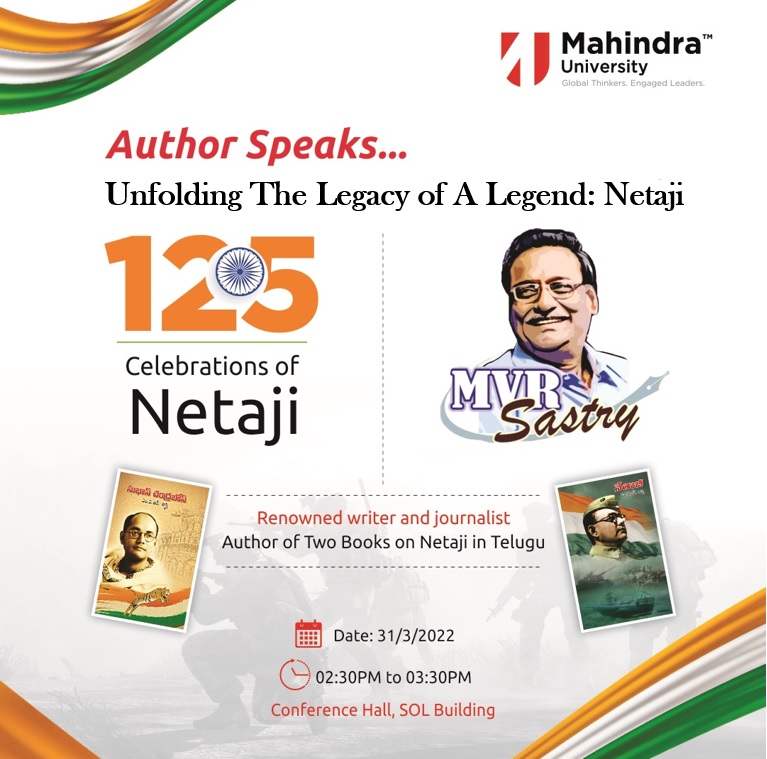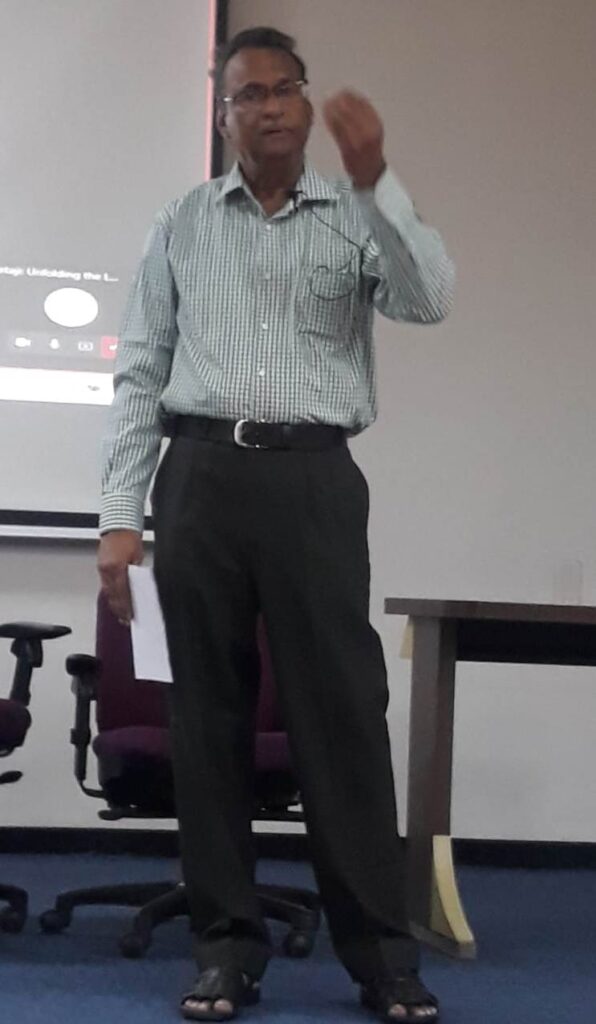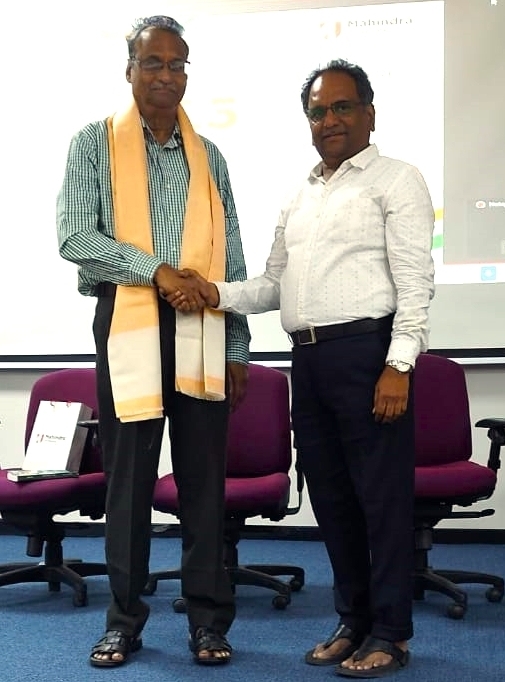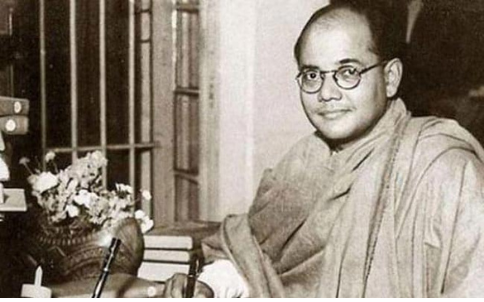Author Speaks… at School of Law, Mahindra University
Renowned Telugu Journalist and author M V R Sastry has presented authentic and logical reasons to conclude that Netaji was not Gumnami Baba and the plane crash is a stark reality. Speaking at School of Law, Mahindra University, in “Author speaks..” program on the occasion of 125th birth celebrations of Netaji Subhas Chandra Bose, the author of two Telugu books on this national hero, Sastry highlighted the exemplary leadership and uncompromising political approach of Subhas Chandra Bose. The speaker raised a brainstorming question: did India gain independence due to the supreme sacrifices made by Netaji Bose and his Indian National Army or by non-violence satyagraha?

This talk is in continuation of its previous Author speaks program on ‘Mysteries and Untold Stories of Netaji Subhas Chandra Bose’ by investigative author Chandrachur Ghose last week, who said that there was overwhelming evidence to say Gumnami Baba was Netaji himself. Sastry reasoned it out saying the heroic and adventurous character of Netaji is not compatible with a silent and inactive or docile person living incognito and dying an ignominious death. It was not in keeping with his character. He is a hero and died in plane crash, which was proved beyond reasonable doubt.
MVR Sastry, a well-known Telugu senior journalist, editor of ‘Andhra Bhoomi’ newspaper of Deccan Chronicle group for more than two decades, has investigated into the Indian History and authored books on Indian Freedom Movement, Gandhi, Kashmir, and Netaji Subhas Chandra Bose. He appealed to the nation to show some gratitude to the great son of India as a number of students and faculties eager to listen to the guest speaker. He reiterated the need to give the tallest freedom fighter his long-overdue place of honour in history of freedom struggle after 75 years of India’s independence.
Sastry criticized the three Commissions of Inquiry that were formed after independence to investigate the mysterious disappearance of Bose from different angles, and accused them of giving biased reports, being not free of political influence.

He explained in his extempore talk various historic aspects to confirm that Bose died in the ominous plane crash in Taihuku (Taiwan) on 18 August 1945. While noting that almost 77 years have passed since the plane crash, Sastry felt deeply pained as no serious action has been taken to bring back Netaji’s ashes by any government in all these years. Netaji is the only hero who has just date of birth but no date of death, and this year being 125th birth anniversary, he called for a coordinated campaign to create pressure on the present government, bring back the ashes from the Renkoji temple in Japan, and conduct a DNA test.
He reiterated that between 1945 and 1974, almost ten investigations took place which were conducted by the British Army, by the Allied Command based in Japan, the Government of British India, the Governments of Japan and Formosa, followed by commissions appointed by the Government of India, and also by individual journalists and followers of Bose and all of them concluded that Netaji died on the fateful night of 18 August 1945, after third-degree burn injuries due to air crash.
While sharing his apathy towards the official version of the plane crash theory, Sastry also raised concern over how few authors have given rise to various conspiracy theories on the death and reappearance of Subhas Chandra Bose. In his talk, Sastry extended his solidarity to the recent demand and movement of Jana Sena Party President and famous film star of the South, Pawan Kalyan, who demanded that the ashes of Netaji be brought back to India and kept in the Red Fort and tricolour be hurled above it so that the mysteries surrounding Netaji’s death is removed forever and the leader gets his due from the people of his motherland.

The School of Law (SoL), Mahindra University, had organized this lecture series “Unfolding the legacy of a legend: Netaji”, recently to commemorate the 125th birth anniversary of Bose. MVR Sastry’s well-researched narrative about Bose’s determined character and his resolution to free his motherland from the shackles of the British Raj created an urge among the audience to explore further details about the incredible contributions of the forgotten hero.
However, Sastry’s conviction about the plane crash theory in 1945 was contested by Dr. Paromita Das Gupta, a history faculty at the School of Law. Dr. Das Gupta, based on the study of the Mission Netaji group including Chandrachur Ghose and Anuj Dhar, raised some pertinent questions regarding the authenticity of the plane crash theory since no inquiry commission had ever visited the crash site and collected data from ground zero. She was particularly interested in understanding why the passenger list of the fateful flight which is supposed to have killed Netaji was not found yet, why Netaji’s co-passenger and his closest aide Habibur Rahman who also planted the crash theory, never had a scratch on his body despite a shocking plane crash that caused third-degree burns to which Netaji succumbed in 1945. Doubts were raised by the historian about the authenticity of the death certificates issued in 1956 and as late as 1988 for allegedly the same individual but with two different names.

Appreciating the questions, Sastry took these questions and stated that there was circumstantial evidence to prove that Netaji died in a plane crash and bring closure to this long-running disappearance saga of a leader who delivered his promise: a Free India through strategies that appeared to be unacceptable to his contemporaries, but that captured the essence of our great national leader. Netaji’s mantra was: “Give blood, I will give freedom”, and he kept the promise.
The Dean, School of Law, Prof. Madabhushi Sridhar Acharyulu, former Central Information Commissioner of India, said that he was perplexed by the government’s response to the questions related to the release of secret documents and reports concerning the death of Netaji. He referred to one RTI request to know the official status of soldiers of Indian National Army, under Netaji, ‘whether Government recognizes INA soldiers as freedom fighters or traiters’? The Dean presented a memento and Law student Anushka Ramacherla proposed a vote of thanks.





Wonderful contribution to place the real history before the country and it will help the youth to derive the spirit of Nationalism from Netaji. Thanks to you and to Sri MVR Sastry